Annual Address by the Leader of the Nation, His Excellency Emomali Rahmon, President of the Republic of Tajikistan to Majlisi Oli (Parliament) of the Republic of Tajikistan

Distinguished members of Parliament, Honorable compatriots,
This year, I am addressing the Supreme Legislative Body and noble people of Tajikistan in growingly complicated situation in the current world, expansion of very dangerous phenomena of the century that is terrorism and extremism, unprecedented expansion of conflict of interests of superpowers for new division of the Globe which is further aggravating and complicating the political situation, as well as escalation of global financial and economic crisis in many countries of the world.
In the modern history of our country we started 2015 with an important political event – election of the members of Majlisi Oli and local assemblies.
I would like to especially note that the elections were held in a peaceful and stable environment and at high political level that once again showed the increasing political awareness and civic responsibility of people of Tajikistan.
I would like to avail myself of this opportunity and thank our noble people for their proactive participation in this important political event of the last year.
Last year, we also hosted a number of important events, such as International Conference to summarize the process of implementation of one of the initiatives of Tajikistan in the United Nations – International Decade for Action “Water for Life”, 2005-2015, the 700th Anniversary of the outstanding Philosopher of the East Mir Said Ali Hamadani and 3000th Anniversary of Ancient Hissar, which overall played an important role in expansion of national sense of responsibility, self-identification and self-consciousness of people of all ages in the country, as well as improving the country’s authority.
Despite the global financial and economic crisis and increased pressure on our national economy, thanks to hard work of our noble people in 2015, we ensured positive economic growth and sustainable macroeconomic indicators, increase of GDP by more than 48 billion somoni and 6 percent of its growth, and inflation accounted 5 percent.
The poverty rate decreased to 31 percent and GDP per capita increased by 3.8 percent. Savings in banks increased by 9 billion somoni or 35 % in the last year.
These indicators promoted improvement of public health and demographic trend, resulting in the average life expectancy equal to 73.5 years and the maternal and child mortality rate significantly decreased compared to previous years.
Maternal mortality has decreased 1.6 times and child mortality 2.5 times during the last five years.
More than 205 000 new jobs were created within state and sectoral programs in 2015. Public debt against GDP accounted for 27.9 percent last year, which is considered to be a stable indicator according to international measurements of debt management.
At the same time, I have to remind that in 2015 majority of sectors of our national economy to some extent were under severe impact of external factors, and this process has negatively affected the trade, balance of payments, exchange rate of national currency and public budget indicators.
To prevent such a situation in the future, the Government has adopted additional action plan, within which for it undertook influential measures to ensure development of real sector of economy, public support of entrepreneurship, attract more domestic and foreign investments, establish production industries and create new jobs, expand cooperation with trade partners and international financial institutions.
Within the anti-crisis action plan with a view of employing unemployed people and labor migrants returning to the country there has adopted “The State Program for Promotion of Public Employment for 2016 — 2017”, which should make it possible to create and restore more than 300 000 new jobs.
Last year, due to continuing negative trend in global markets, the price of main export commodities and products of our country decreased and the external factors significantly affected the national currency.
In addition to this, last year natural disasters, including cold weather in Soghd, floods and earthquake in GBAO and a number of Rasht valley districts and Khatlon region have caused more than 4 billion somoni of loss.
The Government has been undertaking all necessary steps to eliminate negative impact of natural disasters at the earliest.
First and foremost, we have been restoring and reconstructing residential houses of people and destroyed facilities, such as road and bridges, schools and medical facilities and power lines.
In 2015 compared to 2014, our international trade turnover reduced by 18 percent, including export by 9 percent, import by 20 percent and services by 7 % accordingly.
Today’s global economic condition requires from the Government to adopt additional measures to improve various sectors of the national economy in terms of the effective use of financial, industrial and natural resources and potentials, to promote effective fiscal policy, strictly ensure effective use of budget funds, ensured food security, support and protect domestic producers, strengthen export capacity, especially create decent environment for development of entrepreneurship.
It should be noted that most of the instructions, directives and initiatives outlined in the Address of 2015 have been implemented within the available capacities and resources; however, due to decline in export and import, failure in implementation of some indicators of the state budget we were not able to increase wages, pensions and scholarships.
However, this initiative will be one of the highest priorities of the Government in 2016, as I always reiterate that ensuring better living standards of population to the extent possible is the supreme objective of the President and the Government.
Given the country’s economic development, effective public finance management and stabilization of expenditures for implementation of measures foreseen in the last year’s address the next phase of increasing wages will be implemented from the first of July of this year.
Thus, salaries of employees of public administration institutions, law enforcement and military personnel will be increased by 15 percent, salaries of employees of educational institutions, including pre-school, secondary and higher education, and other educational research, cultural, sports and healthcare institutions – by 20 percent, and salaries of employees of social protection institutions, in particular employees of boarding houses for elderly, and persons with disability, home based social assistance units and recreational facilities for veterans of war and labor, and people equated to them – by 25 percent.
The minimum and maximum age-based pension and baseline pension as well as labor pension of citizens will be increased by 20 percent in average.
Alongside with this, the student scholarship and other types of scholarships will be increased by 30 percent, as well as the minimum wage will be increased by 60 percent – from 250 to 400 somoni.
The insurance part of the ensured pensions will also be adjusted. For financing of the mentioned initiatives around 1 billion and 323 million somoni will be allocated from public budget during the year.
Therefore, the Government is tasked to take concrete measures in this regard.
We are in a period when the implementation of a number of national and sectoral programs, including the first National Development Strategy is completed.
With a view to speeding up the activities to achieve our priority objectives and identifying further prospect of the country’s economic and social development National Development Strategy of Tajikistan up to 2030 was developed and it is under the review of ministries and agencies now.
Our earlier declared three national objectives remain as priority in this document and we are strongly intended to ensure their achievement in the nearest future.
These objectives will qualitatively change in upcoming period in order to ensure transfer from energy security to efficient use of electricity, from eliminating communication deadlock to transforming the country into a transit country, and from ensuring food security to providing public access to quality food.
In this regard, we pay priority attention to the efficiency of the economy’s real sectors, human development, production diversity, institutional capacity building and development of regions.
We foresee sustainable development of our country through industrial and innovated development and will make efforts to improve efficient use of recourses and possibilities in all aspects of economic and social sectors and we are already undertaking certain measures to avoid vulnerability of our national economy in a long term period.
With this regard, the Government needs to enhance its activities in earlier outlined areas, strengthen cooperation of the national and local authorities, development partners, private sector and civil society with a view to achieving national strategic objectives.
Industrial production is the engine of national economy, public employment, source of budget revenue and overall the most important factor for solution to social issues.
With a view to implementing these objectives and achieving industrial development a number of sectoral programs have been implemented so far which can promote expansion of primary processing of industrial raw materials and agricultural products.
A number of benefits are foreseen for the better use of industrial potential and increase in processing of local raw materials, including processing of cotton fiber.
In addition to this, a series of privileges have been granted for construction of the majority of important facilities and import of latest equipment and technologies the amount of which during the last 6 years amounted in 20 billion somoni and 4 billion somoni during the last year only. By these steps we have created opportunities for entrepreneurs to develop their business in the country.
Implementation of such activities and sectoral programs made it possible to increase the number of industrial companies, equip them with the latest technologies and increase the industrial production 1.6 times during the last ten years.
However, this indicator is not sufficient to ensure the full supply of the country’s consumption market and increase export.
Therefore, we need to increase the production of goods replacing import through the wide application of the latest technologies to meet market demands in local competitive products and undertake necessary measures to strengthen the country’s export potential and create new jobs.
Implementation of the Government’s policy in extraction and processing industry has showed that it is possible to establish the basis for overcoming the country’s dependence on import of coal, cement, and other construction materials and ensuring their further export.
In addition, we have planned during the next two years to create industrial regions in several districts of the country by launching two oil refinery factories with the capacity of about two million tons, three cement factories with the capacity of more than three million tons, textile factories with the capacity of processing of 52 000 tons of cotton fiber and producing 150 million square meters of cotton fabrics, construction of three chemical factories, a non-ferrous metal processing factory with the capacity of 1400 kg of gold, a metallurgic company with the capacity of 50 000 tons of zinc, and 50 000 tons of lead and another metallurgic company with the capacity of 400 000 ton.
It is worth mentioning that operation of industrial facilities, particularly mineral, ferrous and non-ferrous metals processing factories depends on electric power and other infrastructures.
In this regard, while planning and constructing industrial facilities, it is necessary to take into account the location of these companies from the sources of raw materials, sufficient volume of electric power, water, roads and other production and social infrastructures, as well as focus on application of energy saving technologies.
The issue of industrialization of the country has been duly considered in the strategy of future development of the country.
This step would promote increasing full processing of raw materials, increasing production of local competitive products and strengthening the country’s export potential, creating a decent environment for improvement of foreign trade balance and addressing social issues.
Therefore, the Government, including the ministries of industry and innovative technologies, agriculture and other relevant ministries and agencies need to develop sectoral programs within identified priorities with a view to addressing strategic objectives and ensure their timely and quality implementation.
Our foreign economic relations are expanding thanks to ensuring local production and reduction of administrative and technical barriers and the world community recognizes Tajikistan as a reliable trade partner.
However, the share of import exceeds the demands due to the misbalance of local production in our international economic activities.
Therefore, we need to pay attention to three main areas in our international trade policy strategy – encouragement of export, development of production of export oriented products and simplification of trade procedures.
With this regard, heads of ministries of economic development and trade, industry and innovative technologies, agriculture and other relevant ministries and agencies need to develop a program on promotion of export and production of products replacing import for a midterm period and submit it to the Government for consideration.
Within the implementation of this program, a number of activities need to be undertaken to establish favorable environment for wide processing and marketing of products, increase the number of export products, including reaching production of not less than 20 types of value added products replacing import and additionally ensure production of 20 types of such products for export.
As I have outlined, industry development primarily depends on electric power. However, we have to emphasize that the electric power generated in the country is not yet sufficient to ensure sustainable economic development.
Therefore, alongside with launching new power facilities we need to ensure their efficient use, particularly focus on energy saving equipment and technologies.
In 2016, we plan to commission additional energy facilities with the capacity of 300 MW. Alongside with this, we also plan to commission new industries with the capacity of 350 MW this year.
Though, we have limited extraction of oil and gas, and fuel refinery, however, we have huge hydropower potential and their rational use would increase our possibilities to ensure sustainable economic development and strengthen export capacity by several times.
Future global development largely depends on renewable energy. Because, it is an important factor for ensuring sustainable economic and social development, development of “green economy”, protection of environment, prevention of natural disasters associated with the climate change and reduction of emission of carbon gas.
Tajikistan, as a country with huge water resources, is committed to rational and fair use of these resources through international and regional cooperation, and acknowledges continued implementation of water cooperation diplomacy as the only tool to address challenges in this area.
Access to energy is essential for achieving Sustainable Development Goals, particularly it has become a topical issue in developing and mountainous countries.
Therefore, access to energy for ensuring socio-economic development and poverty reduction is of particular importance for Tajikistan.
In this context, ensuring implementation of Tajikistan’s proposal to declare a new international decade of “Water for Sustainable Development” would be of an important step.
The Government considers hydropower resources as a national wealth. Therefore, we have identified the development of hydropower sector as one of our priorities and in collaboration with international partners we will continue the repair, reconstruction and construction of energy facilities.
During our independence we have implemented 32 public investment projects involving more than 12 billion somoni in the energy sector.
By the end of 2016 the second phase of the Dushanbe-2 Thermal Power Plant (300 MW) amounting 2.5 billion somoni will be launched, which will significantly improve power supply of the population. Also, we will start the construction of CASA-1000 (252 km) regional power transmission line amounting 2.2 billion somoni, which will connect our power grid with the power grids of other countries in the region and promote the expansion of economic cooperation with neighboring countries.
With a view to achieving energy security, the amount of 36 billion somoni we will be allocated from the budget funds and foreign investments; this year only, 4 billion somoni will be allocated for the development of the sector.
The planned construction and reconstruction of power plants in the nearest future will make it possible to ensure full access by the population and various areas of our national economy to electric power and create favorable environment for exporting the excess electricity to the countries of the region in summertime.
One of the engines for economic growth of Tajikistan and employment of population is agriculture, its sustainable development has been ensured over the last years.
As a result of measures undertaken so far, we have ensured real development of gross agricultural products, and during the last ten years it has increased by almost two times, and currently it comprises 23 percent of our GDP in average.
It is worth noting that improvement of land management, effective use of water and land resources, and introduction of re-planting has been promoting the increase of agricultural products.
Over the last 15 years in the agricultural sector 42 public investment projects amounting more than 3.7 billion somoni have been implemented. At present, nine public investment projects amounting 1.5 billion somoni are under implementation in this sector.
With the aim of implementing the Decree of the President of Tajikistan of 27August 2009 «On Additional Measures for Development of Horticulture and Viticulture in the Republic of Tajikistan for 2010-2014» new orchards and vineyards have been created in the area of 50 000 hectares, and the program has been over implemented, and thus we have created more than 100 000 new jobs.
With a view to continuing this trend, the Government has adopted a new program on development of horticulture and viticulture for 2016-2020, which foresees creation of new orchards and vineyards in the area of 20 000 hectares in the next five years.
In this regard, local entrepreneurs need to focus on establishment of enterprises equipped with the latest technologies for processing of fruits and vegetables, production of end products, expansion of the area of greenhouses, logistics centers, as well as refrigerated warehouses to store fruits and vegetables.
Over the recent years, gross agricultural output has been annually growing by more than 7 percent in average and it made 3.2 percent in 2015.
Currently, the consumption market reserves in the country have been created from the local agricultural products and this process has a positive impact on the abundance of the consumption products and their price.
In this regard, I would like to avail myself of this opportunity to thank all farmers of the country for their hard work in increasing production, enriching the consumption market and food supply of the population.
We have a very favorable environment and necessary resources, effective and proper use of which will make it possible to supply the population with food products that lead us to achievement of one of the national priority goals – food security.
In this regard, the Government has to undertake necessary measures to eliminate all existing obstacles towards export of fruit and vegetables, including dried fruits.
Establishment of transport infrastructure is one of the main preconditions for advancement of the national economy taking into account the mountainous relief of Tajikistan.
During the independence, in the transport sphere 45 public investment projects amounting more than 12 billion somoni in total have been implemented, and more than 2000 km of roads have been renovated, built and commissioned.
At present, 14 projects amounting 5.5 billion somoni are under implementation in the sector.
In 2015, we have completed reconstruction of the Dushanbe-Tursunzade highway with the length of 57 km amounting more than 800 million somoni and the Ayni-Panjakent highway with the length of 113 km amounting more than 700 million somoni.
This year, we will complete the reconstruction of the Vasee-Khavaling road with the length of 88 km amounting 370 million somoni.
In addition, the Dushanbe-Qurghanteppa railroad (the Vahdat-Yavan section) will be commissioned which will ensure a linkage between the country’s capital city and one of the largest regions of the country – Khatlon region.
We have constructed more than 190 km of railroad during the independence period.
In 2016, we will start the construction and renovation of several important transport facilities, such as the reconstruction of a part of the Dushanbe-Tursunzade highway (from Avicenna statue to the western gate of the city) amounting 480 million somoni and the Isfara-Khujand road amounting more than 310 million somoni.
With a view to bringing the highway of Dushanbe-Kulob-Kalaikhumb-Khorugh-Kulma in line with the international standards this year we are planning to renovate the two most difficult sections of this highway, which is Kulob-Shuroobod with the length of 32 km, and Shkev-Kalaikhumb with the length of 26 km. The total amount of this project amounts in more than 800 million somoni.
Currently, the preparation works for start of renovation of Kalaikhumb-Vanj automobile road with the length of 110 km and total amount of 2 billion somoni are underway.
Currently, more than 3000 people have been working in implementation of transport investment projects only. In 2015, about 510 km roads have been reconstructed and rehabilitated and 140 bridges have been built and rehabilitated.
In addition, 324 km of roads connecting districts and towns and jamoats amounting more than 70 million somoni have been rehabilitated and reconstructed. Besides, with the use of funds from the Presidential reserve fund 81 km of intercity roads in 21 districts and towns of the country amounting 90 million somoni were reconstructed and repaired.
In this regard, heads of relevant ministries and agencies, as well as regional and town authorities need to undertake necessary measures to expand activities for repairing and rehabilitation of roads connecting districts, towns, jamoats and other populated areas, as well as drinking water supply of the population.
Now, with a view to supplying population of several districts and towns with safe drinking water, seven public investment projects amounting almost 1 billion somoni are under implementation.
In general, 2.5 billion somoni have been allocated for these objectives during the independence period.
Distinguished participants,
The financial situation of our country has become vulnerable as a result of the global economic crisis. The budget of 2016 amounting 18.3 billion somoni has been adopted by taking into account the effective use of existing resources and implementation of the nationally indentified priorities, which is more than 3 billion somoni or 20 percent compared to 2015.
However, I have to outline that the revenue part of the budget is significantly subject to external factors and indirect taxes.
In these circumstances we have to ensure the budged revenue by expanding business and entrepreneurship activities and other sources in order to achieve our ultimate objectives related to the effective use of expenditure part of the budget.
Therefore, Ministry of Finance and the National Bank of Tajikistan need jointly with other relevant public agencies to undertake necessary measures to ensure timely implementation of adopted documents with a view to ensuring the countries financial sustainability and decreasing risks leading to crisis in financial market, ensuring progressive development of investment market, improving efficiency of financial allocations and quality of public services within strategic objectives.
In addition, the Accounts Chamber, the Agency for State Financial Control and Combating Corruption jointly with the Ministry of Finance need to strengthen measures to ensure transparent and targeted use of budget resources and operation of public and joint stock companies with Government shares, as well as prevent corruptive actions.
Over the recent years the banking system has been improving with regard to issues of loans to the production sector, growing the number of customers and increasing the number of microfinance institutions, as well as involving public investment and savings.
In 2015, the credit institutions have issued loans amounting more than 12 billion somoni and small loans amounted 5 billion somoni, one billion of which is issued to the residents of remote mountainous districts.
The number of customers of bank and microfinance institutions has increased by 15 percent during the last year.
In this regard, our monetary policy should be aimed at encouraging important sectors of economy for better management of production and creation of new jobs through improvement of financial conditions and other banking services. In addition, it is necessary to undertake efficient and timely measures for ensuring the national currency sustainability, improving reliability of the banking system, as well as effective and secure operation of the payment system.
In this regard, the National Bank of Tajikistan, the Ministry of Finance and the Tax Committee need to undertake additional measures for ensuring effective and sustainable operation of the banking system, encouragement of investment for development of banks and loan delivery, improvement of the quality of banks’ loan portfolio and accessibility of banking services to customers, strengthening of payment system infrastructure through application of the latest equipment and technologies and activation of the security market.
Distinguished members of the Parliament,
The State and the Government consider the entrepreneurship development as one of the important areas of its activities and undertake necessary measures for supporting entrepreneurs and ensuring favorable environment for development of the sector through provision of various benefits in taxation, customs duty and introduction of moratorium for inspection of businesses.
With a view to developing small and medium enterprises and ensuring access of businesses to loans, we have established business support fund funded by public budged which issued long-term soft loans amounting 95 million somoni to production businesses in 47 districts and towns. We have planned to allocate 120 million somoni from the public budget to this fund.
In addition, the banks and microfinance institutions have issued 7 billion somoni of loans to production businesses in 2015 only, which is more than 26 percent compared to the previous year.
Particularly, as a result of measures undertaken for strengthening business environment and climate investment our country’s ranking has improved and according to the assessment of international financial institutions the country has been included in the last three years into the list of top 10 countries in the field of reforms.
Over the last ten years, more than 90 public investment projects amounting 12 billion somoni have been implemented in the country and at present 63 other projects amounting 19 billion somoni are under implementation.
In addition, there has been attracted more than 7.5 billion somoni as foreign investment in 2015 only, almost 4 billion of which is foreign direct investment.
In the current period of development, public and private sectors and civil society need to proactively participate in the implementation of our priorities.
In addition to this, entrepreneurs need to make more efforts to expand their activities, to import latest technologies, to increase production of competitive products and goods oriented for export, as well as to create new jobs.
Distinguished participants,
Public regulation of labor relations, public employment, creation of new jobs, occupational training and public migration directly impact on the public living standards.
Implementation of the state programs for promotion of public employment made it possible to create more than 1 million permanent, temporary and seasonal jobs over the last ten years, and only public employment agencies ensured employment of 350 000 residents, 30 percent of whom are women.
Alongside with this, the Ministry of Labor, Migration and Public Employment and the Ministry of Education and Science need to bring the vocational education process in line with international standards and real demand of the labor market in order to enhance professional training of citizens and labor migrants.
Taking into consideration the situation with current domestic and foreign labor markets and employment of significant number of citizens the Ministry of Labor, Migration and Public Employment with other relevant ministries and institutions, heads of provinces, towns, districts, organizations, and enterprises, as well as entrepreneurs, heads of primary and secondary vocational institutions need to take necessary measures for creation of new jobs by using all resources and opportunities, and undertake additional measures to establish occupational and language courses for labor migrants.
Alongside with this, efficient measures need to be undertaken to widely introduce home-based jobs, including carpet-weaving, sewing and other handicrafts.
The issue of occupational courses and training of professionals is the most important task of heads of ministries of labor, migration and public employment, education and science, and other ministries and agencies which have educational institutions. Heads of provinces, districts and towns have to take steps for strengthening material and technical basis of educational institutions, particularly adult education centers, as well as undertake necessary measures for training of professionals competitive in the labor market.
In line with the implementation of instructions of the Head of State in 2015, more than 200 000 people obtained different specialties in all institutions of the Ministry of labor, Migration and Public Employment and other ministries and agencies with educational institutions and they are ready for working in both domestic and international labor markets. This process should be continued to improve quality and level of occupational training and study of foreign languages.
In this regard, heads and persons in charge of the sector need to use possibilities of vocational training lyceums, colleges, higher and secondary education institutions and adult education centers to further expand occupational courses.
The Government, with a view to ensuring progress in science and education as a priority area of its social policy, uses all available possibilities and pays a priority attention to development of technical and natural sciences, and takes necessary measures to improve quality of education, introduce and expand the use of information and communication technologies, including the Internet in the educational process, to ensure efficiency of teachers activities and their professional development.
With a view to implementing the objectives of the National Development Strategy reforms and innovations in the education sector are underway. At present, the secondary education institutions have been fully moved to per capita financing and the financial system in these institutions is well regulated.
In this regard, ministries of finance, and education and science need to undertake measures to ensure gradual transfer of pre-school, primary, secondary and higher education institutions to per capita financing system.
It is worth mentioning that 3.15 billion somoni is allocated for development of education sector in 2016 which is more by 10 percent compared to 2015 and 13 times more compared to previous 10 years.
Last year, the Government has adopted “The State Program on Identification and Capacity Building of Talents for 2015-2020”, within which educational centers for talented children will be established in provinces, towns and districts.
By the instruction of the Head of State, for the first time an intellectual development school has been established within the Academy of Sciences of Tajikistan in Dushanbe this year, and the Ministry of Education and Science is tasked to submit to the Government of Tajikistan a draft State Program on establishment of similar schools in administrative centers of all regions.
Thereby, we will be able to create more opportunities for human development and encouragement of juniors to modern and quality education.
It is worth noting that the Program on computerization in Tajikistan for 2010-2015 was completed and it was implemented by 106 percent throughout the country.
Alongside with this, persons in charge of education are instructed to undertake measures to develop a Concept of Continuous Education for 2016-2022 and submit it for consideration to the Government, and undertake additional measures for introduction of such type of education.
Heads of ministries of education and science, economic development and trade, and rectors of higher education institutions are instructed to ensure that during the next 4 years all general education institutions have necessary number of teachers in exact sciences, IT, and foreign languages, particularly English and Russian teachers.
They are also tasked to undertake regular measures to ensure professional development and retraining of teachers and annually report to the Government on the situation in this field.
At present 50 000 out of 170 000 students of the country study at teacher training institutions and more than 10 000 students study medicine.
However, we still need 6 000 physicians and 8100 paramedical staff in health institutions, and 3600 teachers annually.
Once again, I would like to emphasize that the country’s future significantly depends on teachers and development of science and education. We have to remember that only educated nation can raise educated and knowledgeable professionals worthwhile of their period, can ensure progress and can obtain reputation in the contemporary community.
In this regard, once again, I would like to address parents and persons in charge of education, heads of local executive authorities and the whole civil society to make efforts, so that their children do not drop out of schools, and they need to pay due attention to the education of juniors and youth. At the same time, it is necessary for them to strengthen their cooperation with schools and to create favorable environment for the education of their children.
The Government will undertake necessary measures to improve material and technical basis of educational institutions to equip laboratories with the latest equipment and also to train researchers out of talented young people.
The Academy of Sciences needs to further mobilize scholars for the implementation of the country’s strategic objectives, to research important issues of the economy and to contribute in the country’s sustainable development.
In addition, scholars in geology and natural science need to closely cooperate with relevant ministries and agencies to explore, survey, analyze natural resources of the country and include them into the roster of public resources.
With regard to the current situation in the world which is influenced by political, economic, cultural and moral crises, our social science scholars need to implement historical achievements of our people and focus their research on strengthening our state and nation as the most important factor of protection and strengthening of our State Independent.
In this process, the research institutions need to undertake measures to align the subjects of their research with our current policy and research important issues of national governance by taking into account the progress of national economy, future of our country and addressing the topical issues of the society.
We rely on our scholars, particularly young scholars and hope that in the nearest future they will apply the achievements of science and innovation in local production and thereby make their significant contribution in growth of our national economy.
One of the objectives of our Government in this regard is application of innovative technologies in medicine. Lately, we have been widely introducing latest technologies in medical facilities which has made it possible to improve the quality of diagnosis and treatment of patients.
However, we are still lack of specialists skilled in proper and effective application of the latest technologies.
Alongside with addressing healthcare and social protection issues, training of such specialists should be one of the priority areas in activities of the heads and persons in charge of the sector. I have also to note that we are still lack of medical specialists in a number of districts and towns.
The problem of employment of medical specialists especially in Khatlon province is a matter of our concern. The population of the province is more than 3 million and there are 11.3 doctors per 10 000 people, which is very low indicator compared to other regions of our country.
This indicator accounts for more than 77 doctors in Dushanbe, 23 – in GBAO and 20 – in Soghd.
Alongside with this, the Medical University which is the only medical institution in the country, has not been able to train necessary number of medical specialists and its physical infrastructure is not sufficient for training more students in order to meet the country’s demand based on the demographic growth compared to 77 years since the establishment of the University when the population of Tajikistan was less than 1.5 million.
Taking into account this situation, the Government, including the Ministry of Health and Social Protection, the Ministry of Education and Science, other relevant agencies are tasked to undertake necessary measures to establish another higher medical education institution in Khatlon region and to ensure its launch by the beginning of the next academic year. In addition to this, they need to undertake additional measures to arrange professional development and retraining of medical specialists, including users of medical electronic devices.
The Government, including Ministry of Health and Social Protection and other relevant agencies, as well as the management of the Tajik Medical University are tasked to undertake necessary measures to ensure full implementation of the requirements of the Program for Development of the Medical University of Tajikistan and to submit to the President their well-grounded conclusions regarding expansion of the educational and physical infrastructure of the University in the shortest possible term.
The Government has been increasing annually funding of the medical sector every year and this year its funding reached 1.3 billion somoni, which is 14 times more compared to 2005.
I would like to note with great satisfaction that at present our medical specialists using the opportunities created by the Government have reached the international level in their works. This made it possible to significantly reduce the number of people visiting other countries for diagnosis and treatment purposes.
In addition, the infectious diseases rate has decreased by 24 times in average, including TB prevalence has decreased by 17 times over the last ten years.
The two years experience of integration of health care and social protection has led to significant results in treatment of persons with disability, social support of poor families, their access to medical services, operation of daycare institutions and rehabilitation of children with disabilities.
I would like to especially emphasize that though the situation with implementation of public policy in social protection, particularly public social benefits to persons with disabilities, orphans and poor families at the local level has improved significantly, however, we need to make more efforts to regularly improve living standards of vulnerable and needy segments of population.
The Government considers the youth related public policy as a key issue and for these purposes necessary measures are being undertaken to support constructive initiatives of the young people.
We need to ensure a favorable environment and raise our children in a way, so that they can choose the right direction in their lives, get modern knowledge and learn modern occupations, and have a position they deserve in the society.
We are proud of our young people, because they have been making their valuable contribution to the development of our country with high level of patriotism and sense of responsibility.
In this regard, the committees of youth, sports and tourism, women and family, religion and national traditions and other relevant authorities, including the heads of regions and districts, are tasked to pay priority attention to the issue of efficient use of creative energy of youth and women, due selection and allocation of qualified specialists of public service from among the well-educated and skillful girls and women and encourage them to learning, acquiring modern professions.
Distinguished members of Parliament,
Within the growingly aggravating and rapidly changing political situation in the world and continuously growing inter-governmental and inter-religious conflicts and organized transnational crimes, protection of our borders and ensuring security of our country and nation is a primary and vitally important issue for us.
The current situation in the region and the world requires from the law enforcement, security and military bodies to seriously strengthen their activities and stand ready for implementation of their duty and responsibilities.
The heads of these agencies have to pay regular attention to physical training and moral education of the military servicemen and personnel alongside with their thorough military training.
Heads and staff of law enforcement and military authorities need to be cautious in implementation of their duties and responsibilities, ensuring rule of law, legal order, law and order, ensuring peace and stability in the society and counteraction to the modern threats that is terrorism, extremism, illicit drugs trafficking and other transnational crimes.
Alongside with thism I have to note that the situation in the world and the need to ensure peace and stability in the country requires from us to improve the material and technical basism as well as financing of law enforcement and military agencies with a view to improving their professional training and military preparedness.
In this regard, the Government has to increase funding of these agencies from the public budget every year and strengthen their material and technical basis in accordance with the current requirements and the world’s political situation.
The recent events in the world, aggravation of the situation in Middle East, Asia, Northern Africa, Europe and other parts of the world shows that terrorism and extremism become a real threat to the contemporary world.
Activities of terrorist organizations are more expanding and their activation, particularly in our neighboring country of Afghanistan has further complicated the situation.
Therefore, the threat of terrorism and extremism to the world security and the security of every individual is no less than the threat of nuclear weapon.
Combating terrorism and extremism requires the creation of an environment of trust and respect of everybody’s interest and unification of all countries of the world to overcome this common threat. The use of double standard policy with regard to terrorism and extremism significantly impedes efficiency of the effort by the world community in joint fight against these phenomena and in contrary creates new contradiction between political and military coalitions and makes the situation more unstable.
I have reiterated at the United Nations and other influential international organizations that a terrorist does not have a homeland, a nationality and a religion.
Beside, the terrifying phenomenon of terrorism which mostly takes place under the religious slogans does not have any relation to Islam, in contrary it is committed by the enemies of this Holly Religion and first and foremost the Islamic countries and the Muslims of the world are the victims of the terroristic severity.
It is regretful that some international organizations close their eyes on open financing of terrorist and radical organizations by a number of countries and foundations, violation of human rights, unbearable situation and drowning of thousands of refugees in their way to migration, including women and children.
Therefore, one can say that the situation with the international law has weakened and independence of national states has become vulnerable as a consequence of the use of force in international relations, the facts that some global and regional superpowers counteract with each other to protect their interests and a number of countries lose their governance system under the influence of external powers and factors, and growing expansion of terrorism and extremism.
Correction of such situation requires strengthening legal framework for combating terrorism and extremism, including the issue of punishment of the countries promoting terrorism, ensuring international investigation of terrorism and trial of political and military leaders, the so called “charity funds”, entrepreneurs and other entities promoting terrorism through international courts.
Independent Tajikistan, which experienced terrifying period of counteraction to extremism and terrorism in the early 90th of the last century and lost tens of thousands of lives, has always been a pioneer in fighting against these phenomena.
Terrifying event of early September, the armed rebel which took place with direct funding and sponsorship of the former leadership of the Islamic Revival Party of Tajikistan once again showed that some foreign political circles still follow their evil-minded intention against the Tajik Nation and want to implement their destructive plans through hired agents and impose a alienated political system on our people.
But the traitors of the Tajik Nation and their foreign sponsors forgot that the honorable people of Independent Tajikistan would not give anybody any chance to again interfere their peaceful and stable life as they did in early 90s of the last century through provocations and conspiracy, and to confuse our hard working people in their way to prosperity.
Thanks to this unity and proactive support of our people, military and law enforcement agencies managed to destroy the criminal plans of terrorists and ensured peace of our country.
These events, the current trends in the globe and the regional situation call on us to be always politically cautious and to stand ready for protection of security, national accord, rule of law and peace and stability in our country.
This situation requires ensuring relevant legal and regulatory framework and zero tolerance to extremism and terrorism within the State strategic agenda.
In this regard, the Prosecutor General’s office is instructed in cooperation with other relevant public agencies to develop a National Strategy of Tajikistan on Counteraction to Terrorism and Extremism for 2016-2020 at the earliest possible and submit it to the Government.
Within expansion of counteraction to terrorism and extremism, we need to expand and specify the entities fighting against these phenomena and alongside with this to strengthen liability and punishment for commitment of crimes against the constitutional order and State Security, terrorism and extremism related crimes, betrayal, complicity in such crimes, including against organizers and promoters.
Therefore, the Prosecutor General’s office, the Ministry of Justice, the Ministry of Internal Affairs, the State Committee for National Security and the National Legislation Center are tasked to thoroughly analyze and review the provisions of the Criminal Code and other relevant laws covering these issues and provide their specific opinion regarding inclusion of necessary amendments and additions to these documents.
With a view to ensuring counteraction to the use of internet for extremism and terrorism purposes the Ministry of Internal Affairs, the State Committee for National Security, the Prosecutor General’s Office and relevant agencies need to submit to the Government their well-grounded proposals regarding establishment of a center for fight against crimes with a use of IT and cyber terrorism.
Once again, I would like to emphasize that strict observance of laws, requirements of military laws and order by the military authorities in the country should be under regular control of heads of relevant public agencies and authorities, and the prosecutor’s office.
We have stated for several times that income from illicit drugs trafficking which makes tens of billions of US dollars every year is one of the main sources of funding of international terrorism, therefore, fight against illicit drugs trafficking is a part of counteraction to terrorism and extremism.
The law enforcement and military agencies of Tajikistan have confiscated more than 113 tons of drugs, including 34 tones of heroin since 1994. This amount of drugs could get 50 million people to drugs addiction.
The law enforcement and military agencies should enhance their activities in this regard and undertake necessary measures to ensure a strong barrier to drugs trafficking, reveal and liquidate organized drug smuggling groups, and improve the tactics of their fight against this phenomenon.
Another threat which impedes sustainable development of state and negatively impacts its reputation at the international level is corruption.
Over the recent years, we have ensured relevant legal and administrative framework to fight against this improper behavior, however, with the view to reducing the tension of corruptive factors we need to ensure more proactive participation of the civil society in this regard and establish zero tolerance environment against corruption.
Alongside with this, the heads of ministries and agencies, local authorities and public servants need to undertake additional measures to prevent these phenomena in all public agencies.
Distinguished Members of the Parliament,
Tajikistan stands ready for development of effective tools for harmonization of national objectives and international efforts, unification of efforts of all stakeholder countries in proper reaction to the threats of the contemporarily world.
Today, we would like to reiterate that Tajikistan pursues the policy of “Open doors”, peace and impartiality oriented foreign policy and in implementation of this policy our country stands ready to expand its friendly relations based on mutual respect, equality and mutually beneficial cooperation with all countries of the world.
In this context, we continue expansion of our constructive and multidimensional relations with our traditional partner, including with the Russian Federation and we will strengthen effective cooperation of the two countries in terms of fight against the current threats and the concerns.
Tajikistan in its peace oriented foreign policy seeks the currently formulating global system free of wars and conflicts, violence and evil mind and fanaticism against nation, religion and cultures, and based on equal and beneficial partnership between all countries.
All threats to global and regional peace, stability and security should be overcome through a constructive dialogue and on the basis of international legal norms, primarily the Charter of the United Nations as a global body for regulation of international relations.
Distinguished members of Parliament,
Dear compatriots,
Despite the unsustainable economic and financial situation continuing at the global level, we need to make all efforts possible, so that through hard work and constructive initiatives of our noble people we could achieve our three strategic goals that is energy security, elimination of communication deadlock and food security.
In this process, for the purpose of ensuring security, peace and stability of society, and national accord each of us is required to make double efforts for the sake of protecting and enhancing the achievements of independence, sustainable development of the national economy, exploration and implementation of science and technology innovation in all areas of life, comprehension of the primary issues of the country’s progress and addressing them in a timely manner.
In addition, the development and the efficient use of human resources, addressing social issues, including training and education of the younger generation in the spirit of pride for national statehood and finally achieving a decent standard and quality of life for citizens are among the top priorities, for which all state agencies and authorities, the public should strive to make efforts in unity and solidarity.
The year of 2016 is a historical year for the glorious people of our country, since we will celebrate the 25th Anniversary of the Independence of our country and I believe that we all will celebrate this landmark event with appropriate achievements.
In this regard, members of the Government, heads of ministries and agencies, civil servants, employees of governmental institutions, enterprises, as well as all honest and patriotic citizens of the country, including you, dear members of Parliament need to feel higher sense of responsibility than ever in this historical period.
Each of us is obliged to perform well enough in a creative way for further strengthening the achievements of independence, enhancing the economic potential of our state, improving living standards of our people and ensuring prosperity of our Motherland, through faithful and honest efforts to achieve our strategic goals at the earliest possible in order to fulfill our civil duty before the public and the Government of Tajikistan.
In the period of independence, we all experienced difficult and hard phases several times and overcome them proudly. We eliminated the threat of destruction of our state and split of our nation, and achieved progress of our state and society.
We all need to be thankful for having our country and state, as well as peace and stability in our country and we need to work harder for the sake of better future and prosperity of our Tajikistan.
With a view to further improving living standards of our population, we all need to ensure efficient use of resources in all areas and avoid unnecessary expenditures and we have to raise our children in the same way.
Today, the glorious people of Tajikistan are well aware that strengthening principals of the state and national governance, improving living standards and ensuring prosperity of our land is primarily associated with the strengthening of self-identity, self-awareness and patriotism.
Now I can confidently say that we, relying on the creative force of our people and thanks to their faithful and hard work, we are reaching our good objectives, which is primarily ensuring better environment for improved living standards of every individuals in our country.
Our hard working and strong-will, proud and patriot people, as well as our compatriots living and working in various countries of the world always support and promote our state policy in achieving this good will.
I would like to thank every individual, both young and elderly people of our country for their support from the bottom of my heart.
I wish to the noble people of Tajikistan, our overseas compatriots, and all of you – dear participants – good luck, health and happiness in practical implementation of our good and constructive intentions and plans.
Thank you.











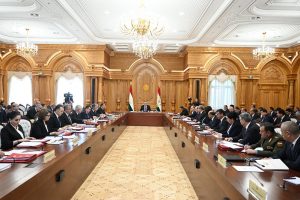 Meeting of the Government of the Republic of Tajikistan
Meeting of the Government of the Republic of Tajikistan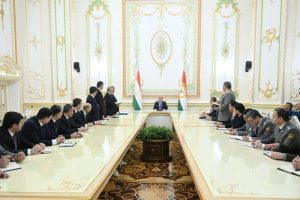 President Emomali Rahmon Makes Personnel Appointments
President Emomali Rahmon Makes Personnel Appointments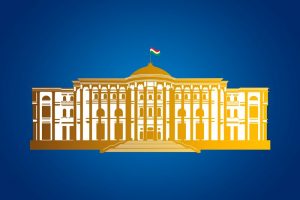 Congratulatory Message of His Excellency Emomali Rahmon, President of the Republic of Tajikistan, on the 33rd Anniversary of the Armed Forces
Congratulatory Message of His Excellency Emomali Rahmon, President of the Republic of Tajikistan, on the 33rd Anniversary of the Armed Forces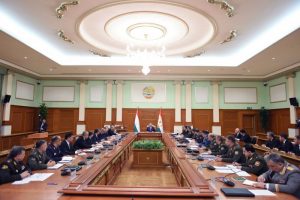 President Emomali Rahmon Holds Security Council meeting
President Emomali Rahmon Holds Security Council meeting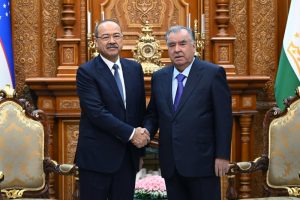 President Emomali Rahmon Receives the Prime Minister of the Republic of Uzbekistan Abdulla Aripov
President Emomali Rahmon Receives the Prime Minister of the Republic of Uzbekistan Abdulla Aripov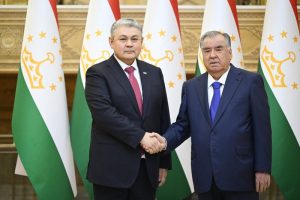 President Emomali Rahmon, Received the Minister of Foreign Affairs of the Republic of Kazakhstan
President Emomali Rahmon, Received the Minister of Foreign Affairs of the Republic of Kazakhstan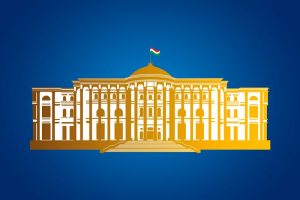 President Emomali Rahmon Enacts New Laws
President Emomali Rahmon Enacts New Laws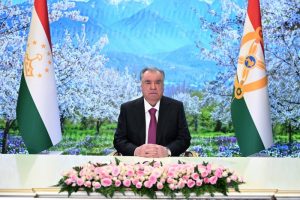 President Emomali Rahmon Sends Festive Greetings to President Xi for Chinese New Year
President Emomali Rahmon Sends Festive Greetings to President Xi for Chinese New Year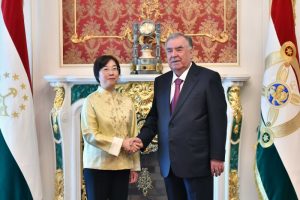 President Emomali Rahmon Receives AIIB President Zou Jiayi in Dushanbe
President Emomali Rahmon Receives AIIB President Zou Jiayi in Dushanbe














